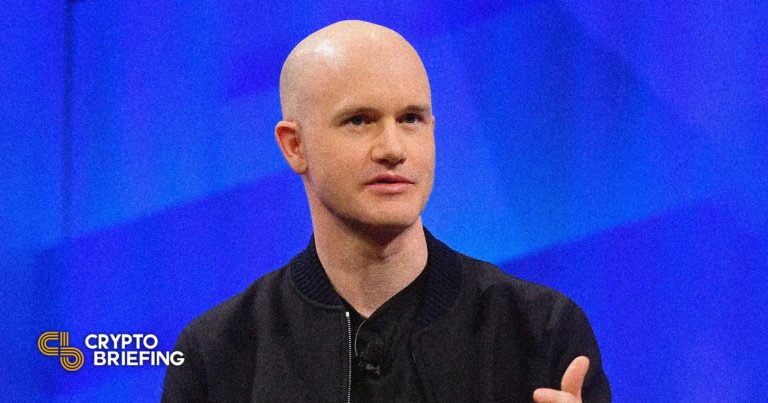Coinbase CEO Brian Armstrong has chimed in on ongoing debates surrounding Ethereum’s ability to remain censorship resistant under Proof-of-Stake.
If Coinbase was forced to choose between preserving Ethereum’s network integrity and complying with regulators to censor transactions, it would prioritize the protocol, Brian Armstrong has said.
It’s a hypothetical we hopefully won’t actually face. But if we did we’d go with B i think. Got to focus on the bigger picture. There may be some better option (C) or a legal challenge as well that could help reach a better outcome.
— Brian Armstrong – barmstrong.eth (@brian_armstrong) August 17, 2022
Responding to a hypothetical scenario posed on Twitter Thursday, the CEO of the U.S. crypto exchange said that the firm would rather close its staking service than comply with potential regulatory requirements to censor Ethereum transactions at the network level.
“If regulators ask you to censor at the ethereum protocol level with your validators will you: A) comply and censor at the protocol level, [or] B) shut down the staking service and preserve network integrity,” Rotki founder Lefteris Karapetsas wrote in a post tagging some of the largest Ethereum token stakers, including Coinbase. Responding to the question, Armstrong said:
“It’s a hypothetical we hopefully won’t actually face. But if we did we’d go with B i think. Got to focus on the bigger picture. There may be some better option (C) or a legal challenge as well that could help reach a better outcome.”
Armstrong’s comments come amid a raging debate within the cryptocurrency community concerning the prospective strength of Ethereum’s censorship resistance following its anticipated “Merge” upgrade to Proof-of-Stake, which is scheduled to ship next month.
The debate kicked off last week after the U.S. Treasury Department’s Office of Foreign Assets Control sanctioned the Ethereum-based privacy protocol Tornado Cash. A few days later, Dutch authorities arrested Tornado Cash developer Alexey Pertsev on suspicion of “concealing criminal financial flows and facilitating money laundering.”
Several notable U.S.-based crypto entities, including crucial blockchain infrastructure providers Infura and Alchemy and stablecoin issuer Circle, immediately complied with the sanctions, blocking users from accessing the website and blacklisting Tornado Cash-related addresses. dYdX and Aave, two of Ethereum’s most popular DeFi applications, also blocked certain users following the Treasury’s bans (both projects later lifted some of the blocks following controversy in the community).
The unprecedented nature of the ban and the swift reaction from centralized service providers raised concerns that centralized entities may eventually be forced to censor transactions at the Ethereum network’s protocol level in the future. Some raised fears that Coinbase could potentially cave under regulatory pressure to exclude certain transactions from being included in new blocks on Ethereum. According to Dune data compiled by hildobby, Coinbase is slated to become the third-largest Ethereum validator with over 14.7% market share of all ETH staked.
If a big centralized validator like Coinbase opted to censor transactions, other Ethereum validators and clients could potentially decide to coordinate and slash the validator’s stake. That would effectively destroy all ETH that investors had entrusted to it. According to a recent Twitter poll posted by Eric Wall, a significant majority of users, including Ethereum’s creator Vitalik Buterin, would opt to slash a validator’s stake if they censored transactions at the network level.
As the debate rages, Armstrong’s indication that Coinbase would prefer to close its staking service than comply with potential censorship demands will likely come as a relief to the Ethereum community.
Disclosure: At the time of writing, the author of this piece owned ETH and several other cryptocurrencies.
The information on or accessed through this website is obtained from independent sources we believe to be accurate and reliable, but Decentral Media, Inc. makes no representation or warranty as to the timeliness, completeness, or accuracy of any information on or accessed through this website. Decentral Media, Inc. is not an investment advisor. We do not give personalized investment advice or other financial advice. The information on this website is subject to change without notice. Some or all of the information on this website may become outdated, or it may be or become incomplete or inaccurate. We may, but are not obligated to, update any outdated, incomplete, or inaccurate information.
You should never make an investment decision on an ICO, IEO, or other investment based on the information on this website, and you should never interpret or otherwise rely on any of the information on this website as investment advice. We strongly recommend that you consult a licensed investment advisor or other qualified financial professional if you are seeking investment advice on an ICO, IEO, or other investment. We do not accept compensation in any form for analyzing or reporting on any ICO, IEO, cryptocurrency, currency, tokenized sales, securities, or commodities.
See full terms and conditions.
Join more than 100,000 subscribers
Author
Administraroot


